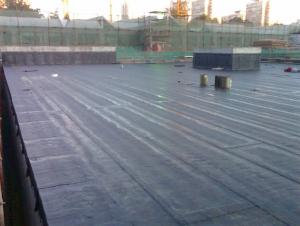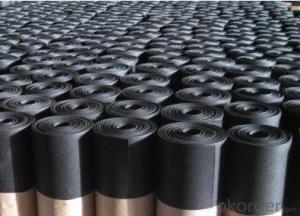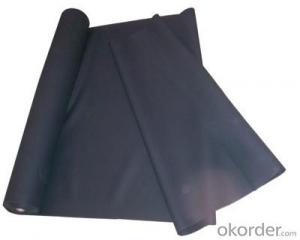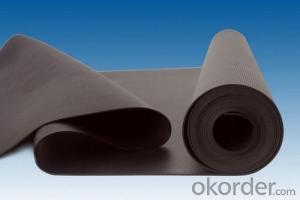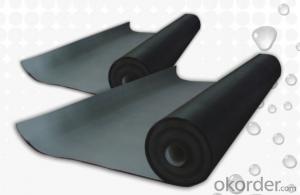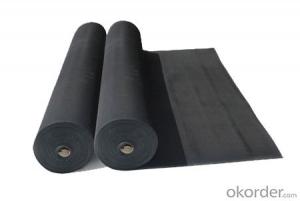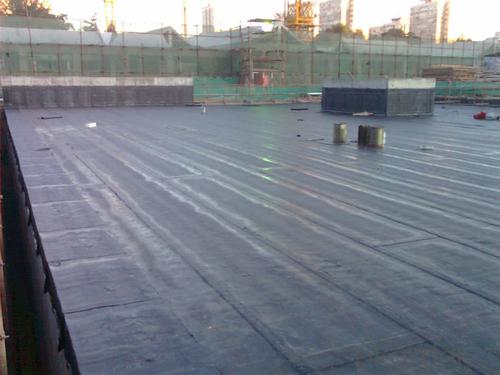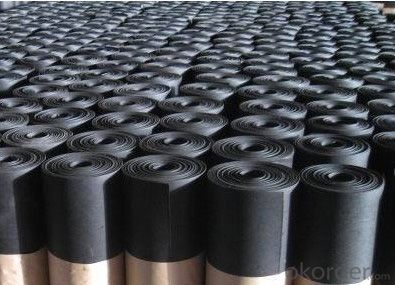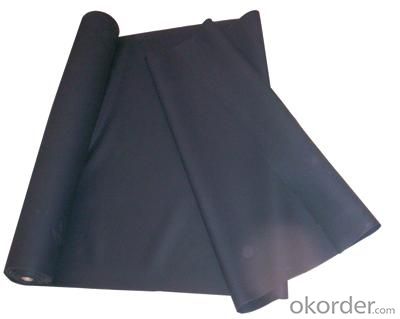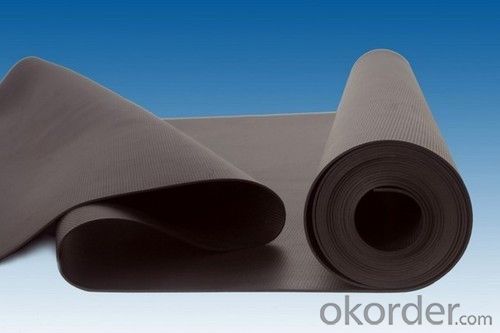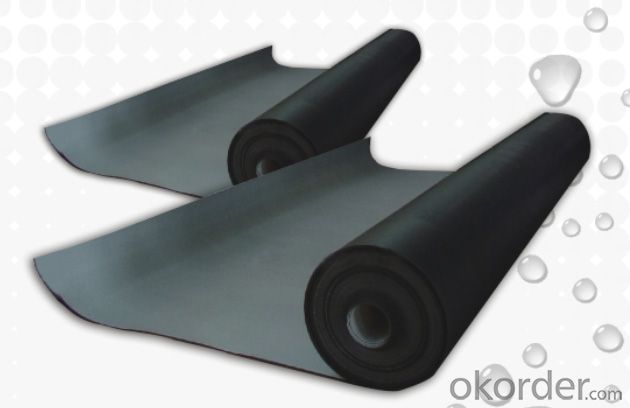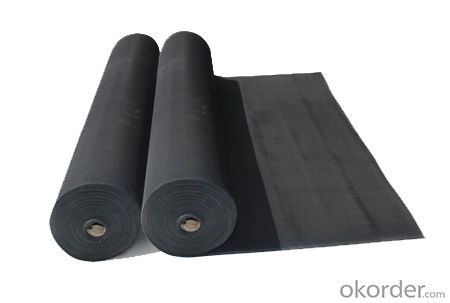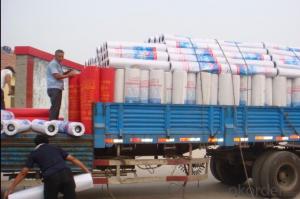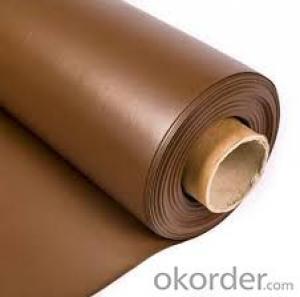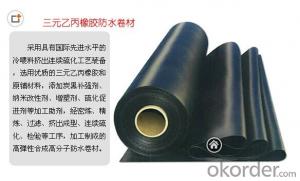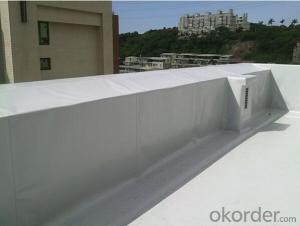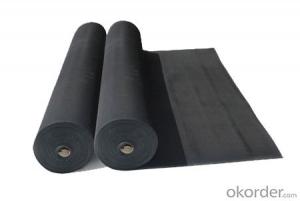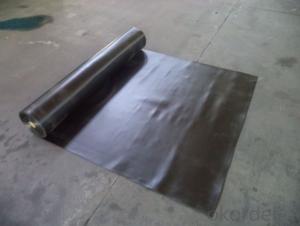EPDM Coiled Rubber Waterproof Membrane with 2.0mm Thickness
- Loading Port:
- Shanghai
- Payment Terms:
- TT OR LC
- Min Order Qty:
- 20000 m²
- Supply Capability:
- 5000000 m²/month
OKorder Service Pledge
OKorder Financial Service
You Might Also Like
EPDM Coiled Rubber Waterproof Membrane with 2.0mm Thickness
Description Of EPDM Coiled Rubber Waterproof Membrane with 2.0mm Thickness:
This waterproof coiled material is of high elasticity with best performance among high polumer
waterproof coiled material in the world.It is also the most typical one in the world.Waterproof coiled material made of ternary ethylene-propylene rubber is produced withthe use of the most advanced contiuous extrusion and vulcanization technology and related equipments which are specially designed for production of such product.It is good in compactness,without bubble and performance difference in length and breadth,perfomances reach or exceedthe demands of GB18173.1-2000 standard.
Main Features of EPDM Coiled Rubber Waterproof Membrane with 2.0mm Thickness:
A.Polyester based SBS Modified Bitumen Waterproofing Membrane
a. Strong impermeability
b. High tensile strength, elongation, ability to adapt the grassroots shrinkage deformation and cracking
c. Puncture-resistant, broken resistant, tear-resistant
d. The corrosion resistance, resistance to mildew, weathering good
e. Construction convenient, hot-melt can be operated Four Seasons Construction, reliable joints
B. Fiberglass based SBS Modified Bitumen Waterproofing Membrane
a. High tensile strength, stability of a good size
b. High Temperature good performance
c. Damage resistance, corrosion resistance, resistance to mildew, weathering good performance
d. Good construction performance, reliable joints.
Specifications of EPDM Coiled Rubber Waterproof Membrane with 2.0mm Thickness:
| Material | EPDM Rubber |
| Size | 1.2m (width)*20m (length) or customized, weldable type 2.05m or 4m width |
| Thick | 1.2mm, 1.5mm, 2.0mm |
| Type | Vulcanized & Weldable |
| Pattern | Non-reinforced (homogeneous) |
| Certificate | ISO9001/14001 |
Applications of EPDM Coiled Rubber Waterproof Membrane with 2.0mm Thickness:
1. Roofs, Basement, Toilet
2. Industrial and civil building waterproofing
3. Geo-synthetic liner for swimming pool, channels, irrigation system
4. Especially suit for projects with high requirements in durability, anti-corrosion and deformation
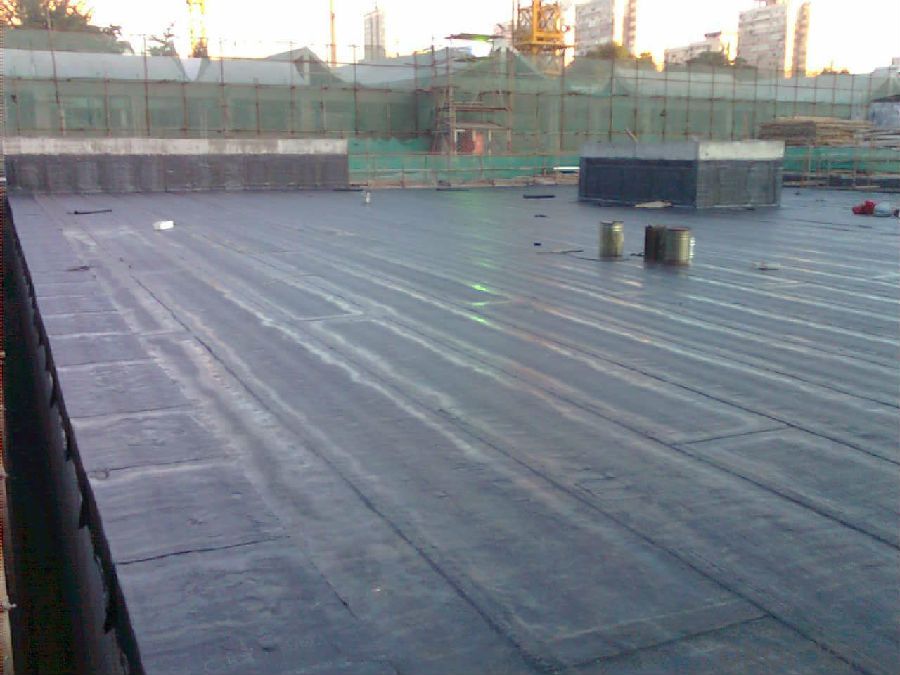
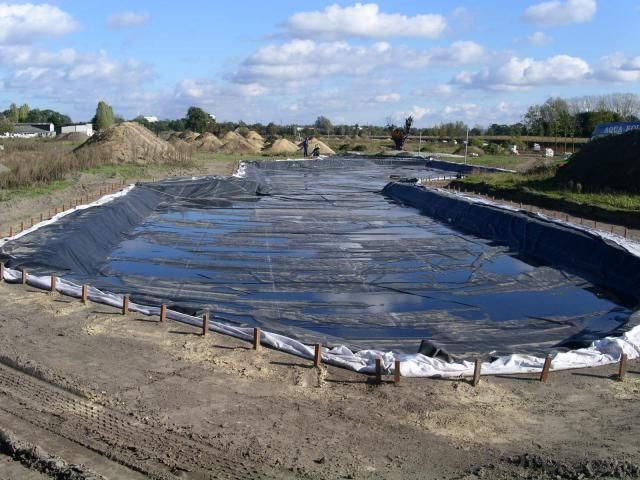
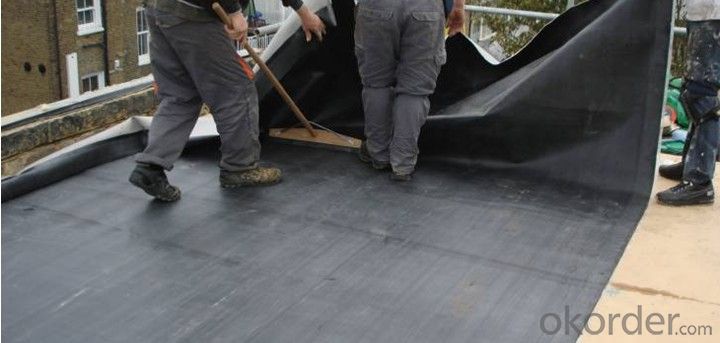
IMages of EPDM Coiled Rubber Waterproof Membrane with 2.0mm Thickness:
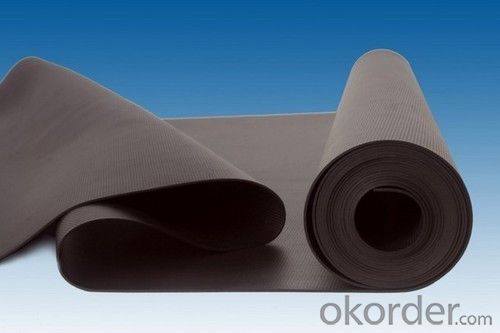
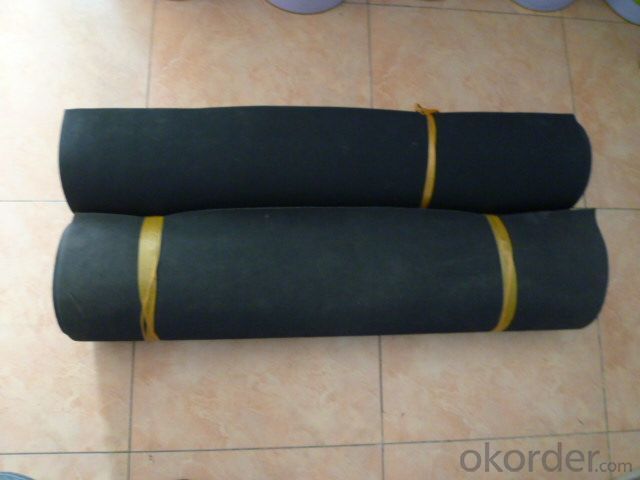
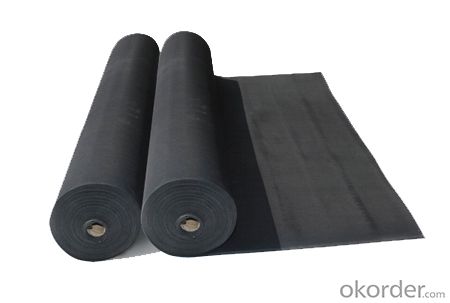
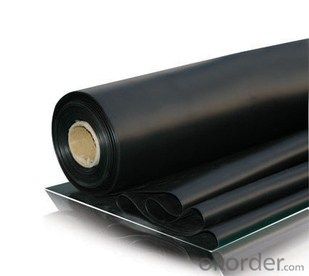
FAQ of EPDM Coiled Rubber Waterproof Membrane with 2.0mm Thickness:
1. What are we supplying?
We are specialized in producing Colorful Asphalt Roof Shingle, SBS/APP modified bitumen waterproof membrane, Self adhesive bitumen waterproof membrane, PVC waterproofing membrane, EPDM rubber roofing membrane, Single Component Polyurethane Waterproof Coating, and Spray Polyurea Waterproof Coating
.
2. How Many years experience do we have?
We have been exported to more than 20 countries in the past 15 years.
3. How long do we usually reply your request?
We always reply our customer within 24 hours.
- Q: Can a waterproofing membrane be used for solar panel installations?
- Indeed, the utilization of a waterproofing membrane in solar panel installations is not only possible but highly recommended. It is common practice to incorporate a waterproofing membrane into the installation process in order to safeguard the roof or other surfaces beneath the solar panels from water-related harm. The primary function of a waterproofing membrane is to serve as a barrier, preventing water infiltration into the underlying structure. This, in turn, ensures the integrity and security of the solar panel installation, which is of utmost significance considering their typical placement on rooftops, where they are exposed to various weather conditions. By incorporating a waterproofing membrane, the longevity of the solar panels is prolonged, and any potential issues arising from water are effectively mitigated, thus preserving their optimal performance.
- Q: Can a waterproofing membrane be used on wood block surfaces?
- Yes, a waterproofing membrane can be used on wood block surfaces. The membrane acts as a protective barrier, preventing water penetration and potential damage to the wood. It is a common practice to use waterproofing membranes on wood block surfaces in order to enhance their durability and longevity.
- Q: Are waterproofing membranes suitable for tunnels?
- Yes, waterproofing membranes are suitable for tunnels. They provide an effective barrier against water infiltration and can help prevent water damage and deterioration of the tunnel structure.
- Q: Can a waterproofing membrane be used in areas with high foot traffic or heavy loads?
- A waterproofing membrane is viable for use in areas subjected to heavy foot traffic or substantial loads. These membranes are created to serve as a protective barrier against water infiltration and can withstand different forms of stress, including foot traffic and heavy loads. However, it is imperative to select a waterproofing membrane that is explicitly designed for such circumstances. Multiple membrane options are available, each possessing varying levels of durability and strength. It is of utmost importance to seek guidance from a professional waterproofing expert or manufacturer to ensure that the chosen membrane is suitable for the specific requirements of the high foot traffic or heavy load area. Proper installation and maintenance of the membrane are also crucial for its long-term effectiveness in these conditions.
- Q: Can a waterproofing membrane be used for above-grade applications?
- Indeed, above-grade applications can benefit from the use of a waterproofing membrane. In construction, waterproofing membranes are widely employed to safeguard structures against water infiltration and subsequent harm. While they are commonly utilized for below-grade purposes like basements and foundations, waterproofing membranes can also be applied above-grade on surfaces such as roofs, decks, and exterior walls. When utilized above-grade, waterproofing membranes serve as an effective moisture barrier, preventing water from permeating the structure. These membranes are specifically designed to endure prolonged exposure to various elements, including rain, snow, and UV rays. By effectively sealing the surface, a waterproofing membrane aids in shielding the structure from water damage, mold growth, and deterioration. Several types of waterproofing membranes are available for above-grade applications, including liquid-applied membranes, sheet membranes, and self-adhering membranes. These membranes are typically constructed from materials such as modified bitumen, polyurethane, or rubberized asphalt, which possess exceptional waterproofing properties. Proper surface preparation is crucial when installing a waterproofing membrane above-grade. The surface must be thoroughly cleansed, completely dry, and devoid of any substances that might undermine the membrane's adhesion. Additionally, it is vital to adhere to the manufacturer's instructions and guidelines regarding application techniques and recommended thickness. In conclusion, a waterproofing membrane can effectively shield structures from water infiltration and damage when used in above-grade applications. By selecting the appropriate membrane type and adhering to proper installation procedures, a durable and dependable waterproofing system can be established for above-grade surfaces.
- Q: Are waterproofing membranes resistant to corrosion?
- Yes, waterproofing membranes are resistant to corrosion. These membranes are specifically designed to provide a barrier against water, moisture, and other corrosive elements. They are made from materials that are not prone to corrosion, such as synthetic polymers like PVC or TPO, or rubberized asphalt. These materials have excellent resistance to water and moisture, as well as to chemicals and other corrosive substances. Therefore, when properly installed and maintained, waterproofing membranes can effectively protect structures against corrosion and extend their lifespan.
- Q: Does a waterproofing membrane have any impact on the thermal performance of a structure?
- Yes, a waterproofing membrane can have an impact on the thermal performance of a structure. By preventing the ingress of moisture, a waterproofing membrane can help maintain the integrity of insulation materials and prevent thermal bridging, resulting in improved energy efficiency and better thermal performance of the building.
- Q: What is the warranty or guarantee for a waterproofing membrane?
- The warranty or guarantee for a waterproofing membrane can vary depending on the manufacturer and product. Generally, a waterproofing membrane should come with a warranty that guarantees its performance and durability. This warranty typically covers defects in materials or workmanship and ensures that the membrane will remain waterproof for a certain period of time. The length of the warranty can range from a few years to several decades, depending on the quality and type of the membrane. Some manufacturers may offer a limited warranty, which means that certain conditions or limitations apply. For example, the warranty may only cover the replacement of the membrane itself, excluding any additional costs such as labor or damage to other parts of the structure. It is important to carefully read and understand the terms and conditions of the warranty before purchasing a waterproofing membrane. This will give you a clear understanding of what is covered and what is not, as well as any specific requirements or maintenance guidelines that need to be followed to maintain the warranty validity. In addition to the warranty provided by the manufacturer, it is recommended to choose a reputable and experienced contractor for the installation of the waterproofing membrane. Many contractors also offer their own warranty or guarantee on their workmanship, which can provide an additional layer of protection and assurance. Overall, the warranty or guarantee for a waterproofing membrane is an important factor to consider when selecting a product. It provides peace of mind and ensures that you are protected against any potential defects or failures in the membrane, giving you confidence in the long-term performance and durability of your waterproofing system.
- Q: How is the water level rated and how many grades are used?
- 1, roof waterproof level 1: Application: particularly important or waterproof with special requirements of the building; Waterproof layer of reasonable use of life: 25 years; Waterproof layer selection of materials: should use synthetic polymer waterproofing membrane, polymer modified asphalt waterproofing membrane, metal sheet, synthetic polymer waterproof coating, fine stone concrete and other materials; Fortification requirements: three or more than three waterproof fortification.
- Q: Is the foundation pit waterproofing and the foundation pouring on the working face?
- The current project is generally not in the bottom of the foundation to do the membrane waterproof, and generally will be changed into fine stone concrete or cement mortar to do rigid waterproof, in the base side and the basement wall to do the membrane waterproof, the base of the waterproof before the banding reinforcement, Basic side and basement wall waterproofing after basement wall construction is done
Send your message to us
EPDM Coiled Rubber Waterproof Membrane with 2.0mm Thickness
- Loading Port:
- Shanghai
- Payment Terms:
- TT OR LC
- Min Order Qty:
- 20000 m²
- Supply Capability:
- 5000000 m²/month
OKorder Service Pledge
OKorder Financial Service
Similar products
Hot products
Hot Searches
Related keywords
